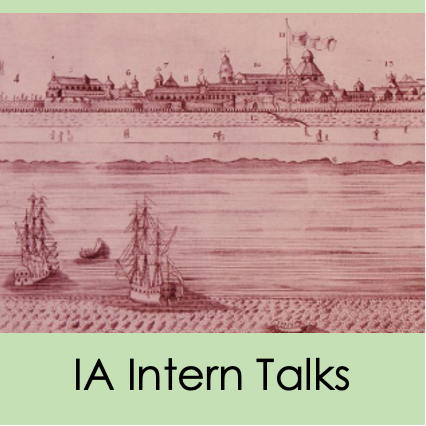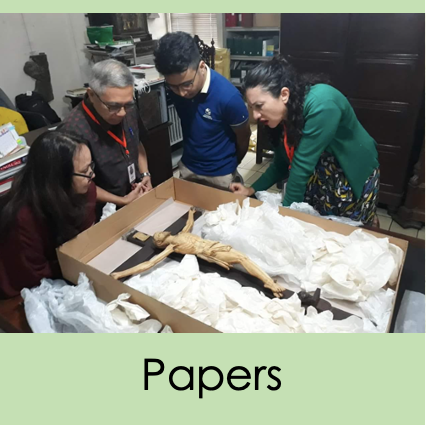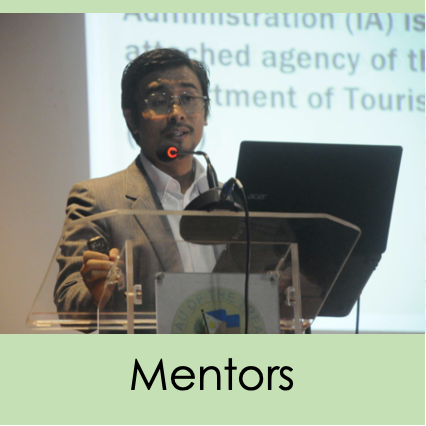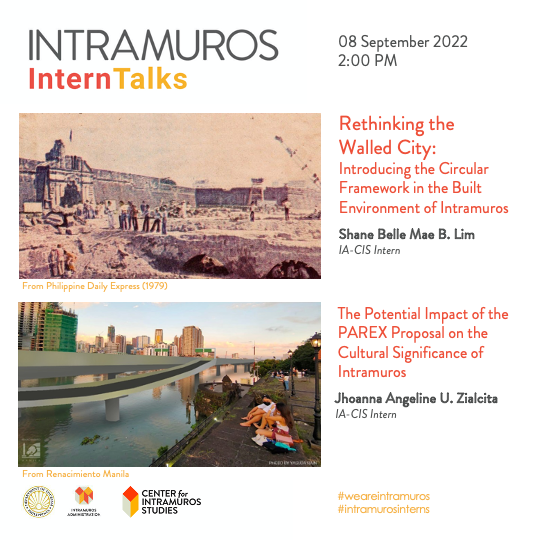
Rethinking the Walled City: Introducing the Circular Framework in the Preservation and Development of Intramuros’ Built Environment
Shane Belle Mae B. Lim
The Linear Economy Framework has become the standard design for the architectural field. This has then made the field an active contributor to the rising temperature and worsening climate change. As such, the researcher aimed to introduce the Circular Design Framework into the preservation and development of Intramuros’ built heritage as it is one of the Philippine’s forefront relic of its history. This is achieved through qualitative research in which a pool of literature regarding Intramuros’ current context and policies are synthesized with the circular principles consisting of its economic, environmental, and social dimensions. These are then used to create a circular framework specific to Intramuros. However, due to the limitations brought by the pandemic, further research and verification is suggested.
Interested in a copy of this paper? Contact us: research@intramuros.gov.ph
Mentor:
- Christian Emmanuel Catahan
Panel Discussants:
- Erik Akpedonu, Ateneo de Manila University
- Xander Lacson, University of the Philippines Diliman
The Potential Impact of the PAREX Proposal on the Cultural Significance of Intramuros
Jhoanna Angeline U. Zialcita
Cultural heritage in the Philippines is facing conservation challenges as the country’s urbanization accelerates. The shift towards contemporary art forms weakens the authenticity of its historical built heritage and environmental setting. With the growing demand for transportation mitigation in Metro Manila, San Miguel Corporation proposed an elevated expressway. The Pasig River Expressway (PAREX) is designed to be constructed on the Pasig river alignment, obstructing the scenic views of the country’s historical landmarks. One of the affected areas in the PAREX proposal is Intramuros. In this study, the PAREX rationale is examined and compared to Philippine heritage policies, revealing its implications on the country’s cultural heritage. Research reveals that historic urban landscapes, such as Intramuros, are a source of irreplaceable cultural resource that must be conserved. Interventions that are in conflict with its nature must be examined for the safety of its cultural value.
Interested in a copy of this paper? Contact us: research@intramuros.gov.ph
Mentor:
- Christian Emmanuel Catahan
Panel Discussants:
- Erik Akpedonu, Ateneo de Manila University
- Xander Lacson, University of the Philippines Diliman
About the Speakers
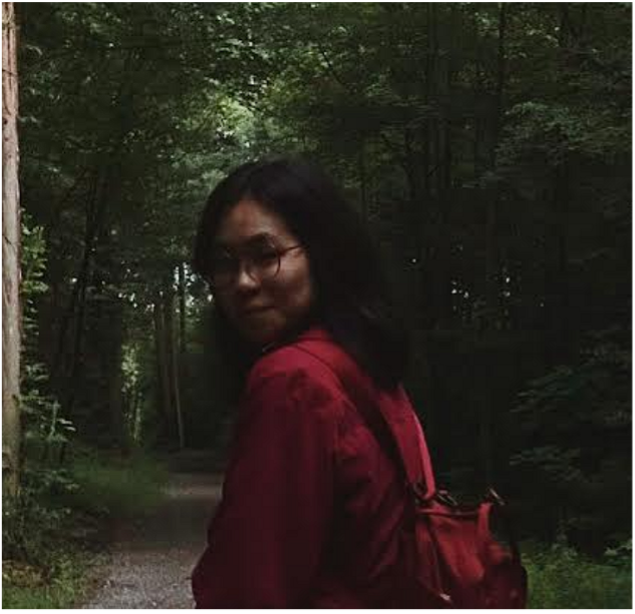
Shane Belle Mae B. Lim is an architecture student specializing in Architectural Heritage from De La Salle College of Saint Benilde. She has a passion for creative problem-solving pursuits both in the built environment and visual communication fields. As such, she is set to actualize one of her aspirations to contribute to Philippines’ motion towards sustainable architecture through solution-based designs.

Jhoanna Angeline U. Zialcita
Jhoanna Angeline U. Zialcita is a De La Salle-College of St. Benilde undergraduate student pursuing a Bachelor of Science in Architecture degree. She took up a specialization in Architectural Heritage Conservation in college which enabled her interest in Philippine Architecture History. During her heritage studies, she was exposed to cultural mapping and conservation methods. Through a series of research papers in her heritage class, she was able to hone her skills in research development and historical analysis. She is also an architecture apprentice during the writing of this paper, incorporating the concepts of environmental planning and history studies. Her experience in architecture has provided a lens on the significance of historic urban landscapes in this paper.
About the Panel Discussants
Erik Akpedonu
Erik Akpedonu teaches Art Appreciation/Architectural History and Philippine Colonial Art & Architecture at the Ateneo de Manila University. He studied Architecture at the Lippe University of Applied Sciences in Detmold, Germany. As Research Associate at the Ateneo`s Institute of Philippine Culture, Erik Akpedonu has been conducting extensive surveys of historic Filipino architecture in Bohol, and in Metro Manila as Project Manager of the Architectural Heritage of Manila Project, 1571-1960. He has published extensively on architecture, urbanism, culture, and heritage, and is co-author of Casa Boholana: Vintage Houses of Bohol (2011).
Xander Lacson
Xander Lacson is an Assistant Professor at the University of the Philippines College of Architecture. His primary lectures are on sustainable design, history of architecture and heritage conservation. He currently teaches for the architectural communications and architectural design studios in the undergraduate program of the college. Xander started teaching in 2019 at De La Salle College of St. Benilde’s School of Design and Art, wherein he is an adjunct-lecturer for architectural heritage conservation. He is an architect in private practice and his portfolio is in interiors for the residential, retail and hospitality sectors. In addition, he is a heritage consultant focusing on heritage and environmental impact assessments. Xander completed his postgraduate degree in Sustainable Heritage at the Bartlett School’s Institute for Sustainable Heritage in 2018, and his undergraduate degree in Architecture at the University of the Philippines in 2008.
About the IA Intern Talks
Intern Talks is a webinar series that will showcase the final output of interns trained under the Center for Intramuros Studies (CIS) of the Intramuros Administration.
The Internship Program, through the CIS, is a research-oriented learning opportunity for interns to work directly with the Administration in its work in directing the orderly development and restoration of the Walled City. Through the Internship Program, the Administration invests in getting students and emerging professionals exposed to Intramuros Studies, Manila Studies, and heritage management. The Administration’s Internship Program challenges interns to apply and hone their current skills in research and development.
Testimonials on the Internship Program
Shane Belle Mae B. Lim
“With a background on Architectural Heritage, I was keen on applying for an internship that would further expose and hone my skills in the field. Undoubtedly, the internship in Intramuros Administration has enabled me to achieve so. Herein, I was able to utilize and improve my research and analysis skills and create meaningful outputs that are supplemental to the studies being conducted by the organization. In spite of the online setup, I was able to learn in greater depth the laws, policies, and practices protecting the built heritage of both our country and within Intramuros. Furthermore, the internship has re-acquainted and expanded my knowledge on the rich narrative the Philippines has as seen through the structures within the Walled City. This has then further provided me with insights regarding the country’s standards of preservation, conservation, and restoration of its built heritage. Truly this experience has made me more appreciative of our culture and history while simultaneously aided me in becoming a more competent individual.“
Jhoanna Angeline U. Zialcita
“It is an honor to be alluded to as an intern of the Intramuros Administration, and having this opportunity to reflect on as time passes is exceptional. Before taking the internship, I had no expectations of it but to enjoy the learning process and seek knowledge from my peers. I was able to garner a wealth of information, this will help me as I grow as a Filipino who values history. I would like to credit Sir Christian Catahan for his patience in mentoring me, he allowed me to learn as a history enthusiast. His guidance throughout this internship has been an important role in helping me get through writing this research paper. Thank you to Sir Rancho Arcilla as well for taking me under his internship wing, I am grateful for this educational experience as it will help me in many ways in the near future. I hope to continue on this path of heritage conservation in the years ahead.“
Learn more about the Internship Program of the Center for Intramuros Studies
Interested in applying for an internship at the IA Center for Intramuros Studies? Email us your CV with cover letter via research@intramuros.gov.ph.
Note: The opinions expressed by our interns in their papers and presentations during their internships with us do not necessarily reflect any statement, stand, or position of the Intramuros Administration or of any of its personnel. Moreover, inclusion of research papers or project proposals in the online database of the Center for Intramuros Studies or the website of the Intramuros Administration do not necessarily constitute as an endorsement.
For more information contact the Center for Intramuros Studies via research@intramuros.gov.ph
Cannot find what you are looking for? Try requesting for more data via our eFOI Portal.






